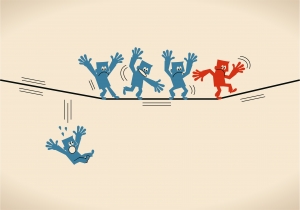
So, what do “feelings” have to do with my risk strategy?
Do you agree that for organisations operating at high levels of risk, there is a need to monitor the working environment for unmet expectations and respond early and actively to violations (Allen, Scott, Tracy, & Crowe, 2014)?
Of course! But I don’t get the connection.
As Anaïs Nin put it, we don’t see the world as it is, we see it as we are. How we process our emotions is related to how we interpret what is going on around us. We then compare what we see happening against what we expect to happen. This applies to collectives as well as individuals.
Sometimes at work when our plans are disrupted we’ll have a strong emotional reaction. But we may not act on how we’re feeling. The people around us may or may not notice the disruption or how we’re feeling. If they did, perhaps they would step in and steer the plans in a new course.
So?
Suppose you’re a leader of a multinational operating in an environment where every decision affects its clients’ profitability. You rely on your managers to notice subtle changes in its markets. Your managers rely on their team members to raise any red flags. Each team member relies on their colleagues to see the signs they don’t.
Suppose just one person in the chain is not emotionally literate. They become aware of a possible red flag, sensing that ‘something’ isn’t right. They recognise this feeling from a time before. They have no recollection of the details of that event, but for some reason they remember that acting on their feelings that time led to a negative consequence. So, today, they equate acting on this feeling with bad outcomes for themselves.
As this person is unable to separate how they are feeling today from the past, they decide not to act on the red flag. They are afraid of what might happen if they do. Consequently, a preventable event occurs, causing the business financial and reputational damage. Worse still, mistrust starts to breed amongst employees who feel they can’t rely on each other to fulfil their responsibilities and interpersonal conflict starts to pervade (that’s a whole other article).
Interesting. What do you recommend?
Make sure your workforce is emotionally competent: –
“We are able to recognise our feelings, name them, share them and manage them and not let them control our behaviour”,
not just emotionally intelligent: –
“We know how we are feeling and are able to describe our emotions”.
Workplace programs with a foundation in emotion processing can help your employees strengthen a range of really important skills, such as:
- How to use their automatic responses to events to drive better decision-making.
- How to change their behaviour in order to positively influence someone else’s.
- How to resolve interpersonal conflict and improve relationships with colleagues.
- How to improve customer satisfaction.
Anything else I need to know?
Just that encouraging your employees to process their emotions is as important as training them to think through problems. Developing collective emotional competency strengthens the skills you need to minimise the risk to your business’s culture, reputation and, ultimately, bottom-line. That’s got to be worth it, right?
